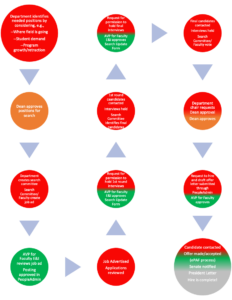Faculty Membership
University Policy provides the following summary of faculty membership, Policy 6-300:
- The University Faculty consists of:
- University President,
- Vice Presidents,
- Deans,
- Directors of Libraries
- Faculty members appointed in the following categories:
- Tenure-line Faculty
- Career-line Faculty and subcategories
- Adjunct Faculty
- Visiting Faculty
- Emeritus Faculty
Tenure-line Faculty:
An appointment to a regular faculty position which is either tenured or tenure-generating is considered to be continuous rather than terminal. All tenured appointments, however, are subject to established policies regarding tenure.
- Ranks:
- Instructor
- Assistant Professor/Assistant Librarian
- Associate Professor/Associate Librarian
- Professor/Librarian
- Honorary Ranks:
- Distinguished Professor
- Presidential Professor
- University Professor
Distinguished Professor:
This category and rank is reserved for faculty whose achievements “exemplify the highest goals of scholarship as demonstrated by recognition accorded to them from their peers with national and international stature, and whose record includes evidence of a high dedication to teaching as demonstrated by recognition accorded to them by students and/or colleagues.” The nomination and selection process is described in Policy 6-303. The website to submit nominations can be found here.
Presidential Professor:
Under exceptional circumstances, the president may appoint an individual to this category and rank. Presidential Professor is reserved for individuals whose achievements exemplify the highest goals of scholarship, and whose record includes evidence of a high dedication as determined by a special advisory committee of Distinguished professors (Policy 6-300).
University Professor:
Each year, at least one faculty member is selected for the special rank of University Professor. This professorship recognizes individuals who have demonstrated extraordinary skills in teaching, distinguished scholarship in their field, and an interdisciplinary approach to undergraduate instruction. The nomination process is covered in Policy 6-300.
Career-line Faculty:
Career-line faculty members participate in the university’s academic programs and make substantial contributions, but their continuing professional activities do not span the full range of responsibilities of regular faculty members in the appointing department or college. Career-line faculty members are non- tenured and have probationary appointments that either terminate automatically every year or are limited by written contracts for up to five-year terms. Career-line faculty may serve on committees and participate fully in departmental affairs but cannot vote on RPT policies or appointments.
Sub-categories of Career-line faculty:
- Research Faculty
- Career-line faculty members who are primarily devoted to research projects.
- Ranks: Research Instructor, Research Assistant Professor, Research Associate Professor, Research Professor
- Clinical Faculty
- Career-line faculty members whose expertise is in the practice or clinical setting.
- Ranks: Clinical Instructor, Clinical Assistant Professor, Clinical Associate Professor, Clinical Professor
- Lecturer Faculty
- Career-line faculty members who are primarily devoted to teaching.
- Ranks: Instructor (Lecturer), Assistant Professor (Lecturer), Associate Professor (Lecturer), Professor (Lecturer)
Adjunct Faculty
- Faculty members whose professional activities do not span full range of regular faculty responsibilities.
- Ranks: Adjunct Instructor, Adjunct Assistant Professor, Adjunct Associate Professor, Adjunct Professor
Visiting Faculty
- Short-term faculty with a cumulative term maximum of three years.
- Ranks: Visiting Instructor, Visiting Assistant Professor, Visiting Associate Professor, Visiting Professor
Emeritus Faculty
This category includes retired members of the faculty who have been appointed to emeritus status (Policy 5-112). These faculty members may be called on for occasional service after retirement. The procedure for nominating faculty to this status can be found here. The nomination form is available here.
Appointments and Search Process
Faculty (and academic library staff) appointments are made by the president. Faculty of the appointing department and college play significant roles in appointments. The president makes appointments only after receiving written recommendations from the department (faculty and chairperson), the college, and the vice president.
Policy 6-301
Appointment Process: Search Procedure Guidelines
The faculty search process strives for a diverse pool of applicants. Below is an infographic of the search process, more detailed information and best practices can be found here: https://academic-affairs.utah.edu/office-for-faculty/faculty-hiring/
Joint Appointment Procedures for Faculty Appointed to Several Departments
The procedure for administering a joint appointment for a new or existing faculty member is governed by Policy 6-319.
Required Disclosure of Criminal Record
If a background check or self-disclosure reveals a criminal background, following an opportunity to respond by the applicant/employee, a risk assessment will be conducted by the Background Review Committee (BRC) per policies 6-301, 5-130, and Rule 5-130A.

